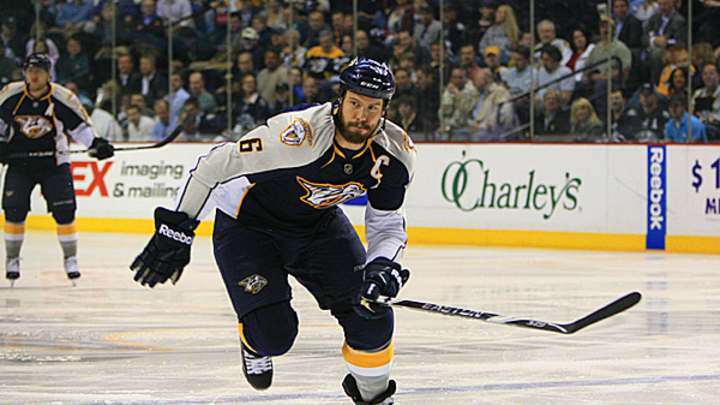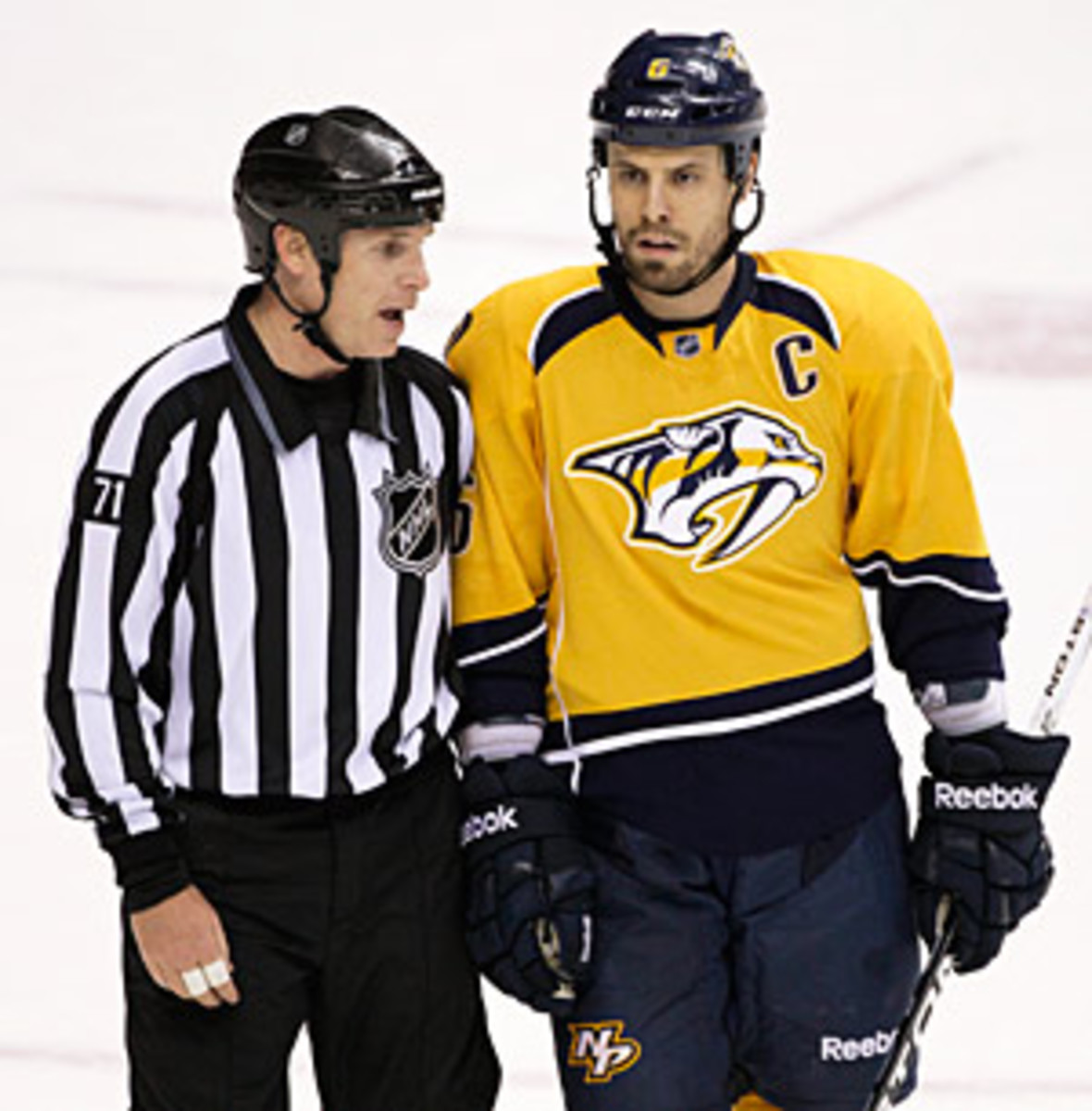Weber's attack deserved suspension

Shea Weber's value to the Predators enabled him to escape serious punishment for his reckless act in Game 1 vs. the Red Wings. (Mark Humphrey/AP)

By Stu Hackel
Earlier this week, I spoke with a friend who is employed in hockey and heard him grouse about some of the pre-playoff stories he'd read in the media. He singled out Michael Farber's essay on this site along with some others, and complained that they shifted the focus from the purely competitive part of the game, the Xs and Os, to the specter of how a concussion or two might impact the tournament.
"The Concussion Lottery, 2012," Comrade Farber called it as he pondered the vast uncertainty and the timing of when and for how long marquee players might be lost to their clubs due to brain trauma. A team could be lucky like the Penguins and get stars such as Sidney Crosby and Kris Letang back for the playoffs, or unlucky like the Flyers and lose Chris Pronger for the duration. It's a crapshoot, as so much of the playoffs can be.
My friend, who is a very bright man, wanted to make the point that we pukes in the media just love to take the focus off the game and smash the NHL at every opportunity.
Well, after watching Shea Weber use Henrik Zetterberg's head to test the firmness of Nashville's plexiglass in Game 1 of their playoff series last night, hearing a number of commenters justify and excuse this deranged attack, and then learning that Weber was only being fined $2,500, it occurred to me that if the NHL was truly serious about punishing unhinged behavior like Weber's, perhaps we pukes wouldn't be so rude as to actually write and talk about it.
This was another chance for Brendan Shanahan to make a break from the past, to handle player discipline differently than his predecessor. But the whispers around the league dating back to the fall, that Shanahan had been intimidated by the old guard of GMs after they disapproved of his initial gutsy suspensions, seem true. His rulings look increasingly like those of Colin Campbell, and the Department of Player Safety will probably function this spring just as Hockey Operations did in previous playoffs.
Many were predicting that not much would come of Weber's act. It's the playoffs, after all, when what might be a piddly three-game ban during the regular season magically gets reduced to an even piddlier one-game ban, and a one-game ban gets reduced to an absurd fine or, worse, a lecture.
Still, the event in question had Weber's name trending nationwide on Twitter on Wednesday night in Canada and even in US along with "Larry David" (who was apparently on Conan O'Brien's show; I missed it); "Kruk and Kuip," who are the San Francisco Giants' great TV announcers Mike Krukow and Duane Kuiper (it seems the pair upbraided a Colorado fan for catching a foul ball and not giving it to his date; I missed it); and "Hillary Rosen" (some minor politico I don't know and probably don't want to, who said something about somebody; I missed it).
In case you missed what the Predators' captain did at the end of the game on Wednesday, take a look:
Let's get this straight right away. There is no way anyone can excuse or justify what Weber did. He used the "It's the playoffs" dodge, and I guess that means we just might as well turn the postseason into Rollerball. His coach, Barry Trotz, rolled out the tried and true grade school playground defense, saying that Zetterberg started it."Zetterberg hit him in the head first," Trotz responded after the game (video) when asked if he thought Weber might get suspended. "There wasn't much there."
Nope, not much there, only a rabbit punch followed by Zetterberg's skull in a headlock worthy of the Iron Sheik and a good solid pane of plexi to ram it into.
In fact, Zetterberg did take a run at Weber (the Predators' home telecast had a better replay angle on it than NBC Sports Net did), who had the puck in the corner and was shielding it with his body as the clock ran down while Nashville protected a one-goal lead. It wasn't a huge hit by Zetterberg and he did get Weber from behind and push him into the glass. No argument there, and it was probably worth a roughing or boarding minor. Weber did not do what he did unprovoked.
But in the parlance of those who mete out NHL justice, what Zetterberg did was "a hockey play." What Weber did was not. There's no playing the puck here. There's nothing even approaching legal body contact. This is just violence, an excessive overreaction, and, for a great pro like Weber, not at all professional. In that moment, Weber lost it. His defense may be rooted in the schoolyard, but his response was straight out of The Sopranos.
The reasons why Weber didn't get what he truly deserves started on the ice and the way the play was called by the officials. He was assessed only a two-minute roughing minor, which is ludicrous. This was a deliberate attempt to injure, a match penalty. After looking at the replay a number of times, one could make a case that the referee in the opposite corner may have had his view obscured by other bodies, but the linesman who comes right in afterward had a perfect view and linesmen are permitted to assist the referee in calling majors, misconducts and match penalties.
As Weber reminds us, however, it's the playoffs, so you never know for certain what rules will or will not be enforced, and league officials -- both on the ice and in the NHL office -- are hesitant to do anything that will take a player out of the lineup, especially if that player is as valuable as Weber. We've argued before that is backward thinking, that in the league's showcase event, the Stanley Cup playoffs, the standards for discipline should be more strictly enforced, not less. Teams want their players to be more accountable in the postseason, but the league lets them be less so when it turns its back on dangerous play like this.
Another certain restraint that helped create the league's inadequate response is the fact that Zetterberg doesn't seem to have been injured on the play. Even though Shanahan acknowledged in his decision that what Weber did was was "reckless and reactionary," since Zetterberg got up and skated away, that could be largely overlooked. "As is customary whenever Supplemental Discipline is being considered, we contacted Detroit following the game and were informed that Zetterberg did not suffer an apparent injury and should be in the lineup for Game 2," Shanahan said. "This play and the fine that addressed it will be significant factors in assessing any incidents involving Shea Weber throughout the remainder of the playoffs." Well, there's a strong message that must have everyone shaking in their skateboots.
No, it takes some serious damage to get the NHL to act, like that to the Kings' Kyle Clifford, who was forced to leave the game after he was boarded by the Canucks' Byron Bitz in L.A.'s victory over Vancouver later on Wednesday night.
Bitz got a major and a game misconduct for picking Clifford's head as the principle point of contact, and Shanahan will be speaking with him. We've seen that sort of play result in suspension all season, so it is expected Bitz will be sitting for at least a game as a result. (There are those who will point to the relative importance of Bitz to his team and Weber to his as being a factor in the league's punishment as well.)
But the apparent non-injury to Zetterberg (concussion symptoms can take time to reveal themselves) shows that the league continues to punish the result and not the intent, unconcerned that every dangerous play that does result in an injury starts with the very same sort of intent. On Wednesday night's NHL on TSN panel (video), Bob McKenzie made this point: "In the National Hockey League, whether people like it or not -- and most people don't -- more often than not, the intent of an action is punished less than the outcome. And the outcome here is that Henrik Zetterberg wasn't hurt. And the optics were terrible on it, especially with the time running out in the game. I personally will be surprised if the National Hockey League suspends Shea Weber for that."
James Duthie then asked fellow panelists Marc Crawford and Aaron Ward what they thought. Crawford cited the intensity of the playoffs that "always boils over at the end of games" while Ward agreed with McKenzie that the lack of injury will be the determining factor. Duthie, a bit miffed, responded, "Can you really allow a guy to do a 'WWE-into-the-turnbuckle-move" on Night One of the playoffs? Because you're setting a precedent on Night One of the playoffs 'OK, this is allowed.' Well, if it's WWE-style, I can tell you by the first night, and the three games we had, we are going to have some cage matches in the first round."
I guess we should just forget it all and enjoy the playoffs, not worry about The Concussion Lottery, about making the games safer and let these guys maim each other without a word. Let's be silently acquiescent to the carnage the league oversees. But wouldn't it be something if Duthie didn't have to be miffed, if McKenzie and Ward didn't have to be surprised, if we didn't have the weak justifications and rationales that Crawford expressed -- not to single him out; his views are not uncommon. Wouldn't it be something if the NHL really backed up its concern about concussions with meaningful punishment to players like Weber, who just couldn't control himself when he felt the urge to retaliate.
But he didn't think twice and that's because the NHL so frequently overlooks or underpunishes transgressors, especially in the playoffs. Shea Weber had no reason to think twice.
COMMENTING GUIDELINES: We encourage engaging, diverse and meaningful commentary and hope you will join the discussion. We also encourage, but do not require, that you use your real name. Please keep comments on-topic and relevant to the original post. To foster healthy discussion, we will review all comments BEFORE they are posted. We expect a basic level of civility toward each other and the subjects of this blog. Disagreements are fine, but mutual respect is a must. Comments will not be approved if they contain profanity (including the use of abbreviations and
punctuation marks instead of letters); any abusive language or personal attacks including insults, name-calling, threats, harassment, libel and slander; hateful, racist, sexist, religious or ethnically offensive language; or efforts to promote commercial products or solicitations of any kind, including links that drive traffic to your own website. Flagrant or repeat offenders run the risk of being banned from commenting.
